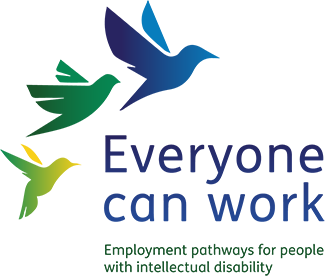Customised employment helps people with intellectual disability to get a job. It works with both job seekers and employers to design and create job opportunities.
Instead of trying to get an existing job, customised employment focuses on the skills that each person has to offer. It customises a job or self-employment opportunity to fit your skills, interests, strengths, and support needs. It also meets the needs of businesses and the community.
Evidence from the US suggests that customised employment can be a very successful approach for people with high support needs. This includes people who have experienced low expectations because of their disability. It has helped many people find and keep a job, as well as increase their income and quality of life.
What are the steps of customised employment?
The customised employment process has been carefully designed and tested. You will need someone who understands customised employment to guide you through two main stages:
- Discovery
- Job creation
1. Discovery
This stage focusses on getting to know you and working out the kinds of supports that work best for you, as well as your:
- strengths
- qualities
- skills
- interests
- preferences.
This information is used to find a work pathway that best suits you. The process can take time (e.g. up to 50 hours) and involve different ways of getting this information. Learn more about this process here.
2. Job creation
This stage uses information from the Discovery stage to create a job that suits you. This could be a job created with an employer, or it could be self-employment in a microenterprise.
Job creation also includes reaching out to potential employers identified during the Discovery stage. Finding the right employer can take a lot of time and effort. It’s one of the things a good DES provider should do for you. Another option is to get help with this using your NDIS plan. Once you’ve found a willing employer, you will work with the employer and your support person to create the job. One way to do this is called job carving. This is when a job is created that suits your skills, strengths and interests by taking tasks from one or more existing job descriptions.
You don’t have to stick with the same provider you have done the Discovery and job creation process with. Once the person has a job opportunity, it’s important that they start planning for ongoing support that meets their needs. They will need to think about any support they need to learn how to do the job and keep doing their work. This is about really understanding what things they need to learn so that the training and support are exactly what they need to do the job well.
The best way for people with intellectual disability to develop the skills they need is by on-the-job training This is different from classroom-based learning about work and is a critical part of how customised employment works.
Using the NDIS to access customised employment
You can get support for customised employment using your National Disability Insurance Scheme (NDIS) plan or through some Disability Employment Services (DES).
NDIS participants of working age can access support for employment, including customised employment. You will need to have a long-term employment goal in your NDIS plan about having a job. You’ll also need short-term goals if you’re just starting out. A short-term goal for customised employment could be getting support to work out what kind of job you want and what you need to do to get that job.
There are lots of service providers offering customised employment, but remember that you are in charge of making decisions about your supports. Also, NDIS funding is designed around you, so that you can get support to suit what you want and need.
You don’t have to fit into a program offered by a provider. You can choose a support person that has the right skills to help you. Some support people may have had training in customised employment. There is also information available to explain customised employment and the supports you may need to take part.
You can find out more about getting ready for work in the ‘Let’s talk about work’ booklet on the NDIS website.
An Easy Read version of the booklet is also available (PDF).
Customised employment is when a job is made to fit the skills, interests, strengths and support needs of a person with disability. They also meet the needs of the employer’s business.Read more Discovery is the first stage of finding someone a job through customised employment.
Read more Job carving is when you work with an employer to create a job that fits your skills and abilities.
Read more The Australian Government-funded disability insurance scheme that funds supports for eligible people with disability.
Read more



